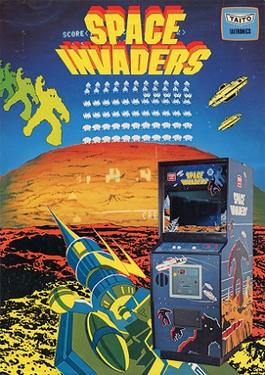
A video game or computer game is an electronic game that involves interaction with a user interface or input device to generate visual feedback from a display device, most commonly shown in a video format on a television set, computer monitor, flat-panel display or touchscreen on handheld devices, or a virtual reality headset. Most modern video games are audiovisual, with audio complement delivered through speakers or headphones, and sometimes also with other types of sensory feedback, and some video games also allow microphone and webcam inputs for in-game chatting and livestreaming.

Pac-Man, originally called Puck Man in Japan, is a 1980 maze action video game developed and released by Namco for arcades. In North America, the game was released by Midway Manufacturing as part of its licensing agreement with Namco America. The player controls Pac-Man, who must eat all the dots inside an enclosed maze while avoiding four colored ghosts. Eating large flashing dots called "Power Pellets" causes the ghosts to temporarily turn blue, allowing Pac-Man to eat them for bonus points.

Space Invaders is a 1978 shoot 'em up arcade video game developed and released by Taito in Japan, and licensed to Midway Manufacturing for overseas distribution. Commonly considered as one of the most influential video games of all time, Space Invaders was the first fixed shooter and set the template for the genre. The goal is to defeat wave after wave of descending aliens with a horizontally moving laser to earn as many points as possible.

Missile Command is a 1980 shoot 'em up arcade video game developed and published by Atari, Inc. and licensed to Sega for Japanese and European releases. It was designed by Dave Theurer, who also designed Atari's vector graphics game Tempest from the same year. The game was released during the Cold War, and the player uses a trackball to defend six cities from intercontinental ballistic missiles by launching anti-ballistic missiles from three bases.
A sports video game is a video game that simulates the practice of sports. Most sports have been recreated with video games, including team sports, track and field, extreme sports, and combat sports. Some games emphasize playing the sport, whilst others emphasize strategy and sport management. Some, such as Need for Speed, Arch Rivals and Punch-Out!!, satirize the sport for comic effect. This genre has been popular throughout the history of video games and is competitive, just like real-world sports. A number of game series feature the names and characteristics of real teams and players, and are updated annually to reflect real-world changes. The sports genre is one of the oldest genres in gaming history.
Video game design is the process of designing the rules and content of video games in the pre-production stage and designing the gameplay, environment, storyline and characters in the production stage. Some common video game design subdisciplines are world design, level design, system design, content design, and user interface design. Within the video game industry, video game design is usually just referred to as "game design", which is a more general term elsewhere.
Video game development is the process of creating a video game. It is a multidisciplinary practice, involving programming, design, art, audio, user interface, and writing. Each of those may be made up of more specialized skills; art includes 3D modeling of objects, character modeling, animation, visual effects, and so on. Development is supported by project management, production, and quality assurance. Teams can be many hundreds of people, a small group, or a even a single person.
The golden age of arcade video games was the period of rapid growth, technological development, and cultural influence of arcade video games from the late 1970s to the early 1980s. The release of Space Invaders in 1978 led to a wave of shoot-'em-up games such as Galaxian and the vector graphics-based Asteroids in 1979, made possible by new computing technology that had greater power and lower costs. Arcade video games switched from black-and-white to color, with titles such as Frogger and Centipede taking advantage of the visual opportunities of bright palettes.

Tomohiro Nishikado is a Japanese video game developer and engineer. He is the creator of the arcade shoot 'em up game Space Invaders, released to the public in 1978 by the Taito of Japan, often credited as the first shoot 'em up and for beginning the golden age of arcade video games. Prior to Space Invaders, he also designed other earlier Taito arcade games, including the shooting electro-mechanical games Sky Fighter (1971) and Sky Fighter II, the sports video game TV Basketball in 1974, the vertical scrolling racing video game Speed Race in 1974, the multi-directional shooter Western Gun in 1975, and the first-person combat flight simulator Interceptor (1975).
An interactive film is a video game or other interactive media that has characteristics of a cinematic film. In the video game industry, the term refers to a movie game, a video game that presents its gameplay in a cinematic, scripted manner, often through the use of full-motion video of either animated or live-action footage.

Traveller's Tales is a British video game developer and a subsidiary of TT Games. Traveller's Tales was founded in 1989 by Jon Burton and Andy Ingram. Initially a small company focused on its own content, it grew in profile through developing games with larger companies such as Sega and Disney Interactive Studios. In 2004, development on Lego Star Wars: The Video Game started with Giant Interactive Entertainment, the exclusive rights holder to Lego video games. Traveller's Tales bought the company in 2005, and the two merged to create TT Games, with Traveller's Tales becoming the new company's development arm.

Jeff Gerstmann is an American video game journalist. Former editorial director of the gaming website GameSpot and the co-founder of the gaming website Giant Bomb, Gerstmann began working at GameSpot in the fall of 1996, around the launch of VideoGameSpot when GameSpot split PC and console games into separate areas. He shared his thoughts on a variety of other subjects every Monday on his GameSpot blog before his controversial dismissal from GameSpot in 2007 following a review of Kane & Lynch: Dead Men. In 2012, Complex magazine named Gerstmann in their top 25 biggest celebrities in the video game industry.

The Japanese multinational consumer electronics company Nintendo has developed seven home video game consoles and multiple portable consoles for use with external media, as well as dedicated consoles and other hardware for their consoles. As of September 30, 2021, in addition to Nintendo Switch, Nintendo has sold over 863.07 million hardware units.

Giant Bomb is an American video game website and wiki that includes personality-driven gaming videos, commentary, news, and reviews, created by former GameSpot editors Jeff Gerstmann and Ryan Davis. The website was voted by Time magazine as one of the Top 50 websites of 2011. Originally part of Whiskey Media, the website was acquired by CBS Interactive in March 2012 before being sold to Red Ventures in 2020, then to Fandom in 2022.

Video gaming in the United States is one of the fastest-growing entertainment industries in the country. The American video game industry is the largest video game industry in the world. According to a 2020 study released by the Entertainment Software Association, the yearly economic output of the American video game industry in 2019 was $90.3 billion, supporting over 429,000 American jobs. With an average yearly salary of about $121,000, the latter figure includes over 143,000 individuals who are directly employed by the video game business. Additionally, activities connected to the video game business generate $12.6 billion in federal, state, and local taxes each year. World Economic Forum estimates that by 2025 the American gaming industry will reach $42.3 billion while worldwide gaming industry will possibly reach US$270 billion. The United States is one of the nations with the largest influence in the video game industry, with video games representing a significant part of its economy.

Blackwater is a first-person shooter video game developed by Zombie Studios with the player assuming the role of a Blackwater Worldwide contractor. The game was first revealed at E3 in 2011, and was later released that year on the Xbox 360, published by 505 Games. Using the Kinect accessory for the console, the game is the first Kinect shooter on the market.

An art game is a work of interactive new media digital software art as well as a member of the "art game" subgenre of the serious video game. The term "art game" was first used academically in 2002 and it has come to be understood as describing a video game designed to emphasize art or whose structure is intended to produce some kind of reaction in its audience. Art games are interactive and the result of artistic intent by the party offering the piece for consideration. They also typically go out of their way to have a unique, unconventional look, often standing out for aesthetic beauty or complexity in design. The concept has been extended by some art theorists to the realm of modified ("modded") gaming when modifications have been made to existing non-art games to produce graphic results intended to be viewed as an artistic display, as opposed to modifications intended to change game play scenarios or for storytelling. Modified games created for artistic purposes are sometimes referred to as "video game art".

In the video game industry, AAA (Triple-A) is an informal classification used to classify video games produced and distributed by a mid-sized or major publisher, which typically have higher development and marketing budgets than other tiers of games. In the mid-2010s, the term "AAA+" was used to describe AAA type games that generated additional revenue over time, in a similar fashion to massively multiplayer online games, by using games-as-a-service methods such as season passes and expansion packs. The similar construction "III" (Triple-I) has also been used to describe high-production-value games in the indie game industry.
Video game writing is the art and craft of writing scripts and narratives for video games. Similar to screenwriting, it is typically a freelance profession. It includes many differences from writing for film, due to the non-linear and interactive nature of most video games, and the necessity to work closely with video game designers and voice actors. There are many differing types of text in video games in comparison to stage shows or movies, including written text, foreign or made-up languages, and often situation-based information. Especially when developing Triple A games, more than one writer will be required to create the game, split into different roles.
The history of video gaming in Spain dates back to the 1970s, and by 2014 the country was the 10th-highest-grossing market for video games worldwide. In 2018, the Spanish video game market posted a revenue of €1.53 billion, up from €1.35 billion in 2017. The country's audience of game players was 16.8 million that year; demographically, it was 59% male and 41% female. Reportedly 80% of people aged 6-to-10 played video games, while 24% of those in the 45–64 age range did so.












